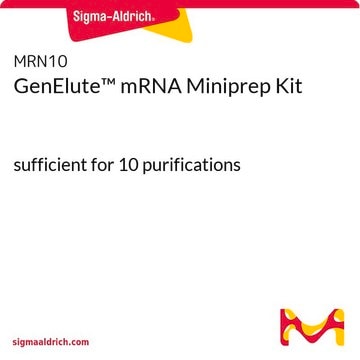MRN70
GenElute™ mRNA Miniprep Kit
sufficient for 70 purifications
Synonym(s):
GenElute™ mRNA Kit, Gen Elute
Sign Into View Organizational & Contract Pricing
All Photos(1)
About This Item
UNSPSC Code:
41105501
NACRES:
NA.52
Recommended Products
usage
sufficient for 70 purifications
Quality Level
technique(s)
RNA purification: suitable
storage temp.
15-25°C
Looking for similar products? Visit Product Comparison Guide
General description
Procedures such as cDNA synthesis, expression profiling and others require separation of mRNA from the vastly more abundant rRNA and tRNA. The GenElute mRNA kits provide convenient procedures for isolating polyadenylated mRNA from previously prepared total RNA or directly from mammalian cells and tissues. For direct mRNA preparation, cells or tissues are disrupted with SDS/proteinase K digestion to release RNA and eliminate RNases. Both kit types use oligo dT30 covalently linked to 1 μm polystyrene beads to capture polyadenylated mRNA by hybridization. The polystyrene beads remain suspended during hybridization, eliminating the need for mixing or rocking, as is common for cellulose or magnetic particles. Polystyrene was also chosen because oligo(dT) polystyrene beads yield cleaner mRNA with fewer stringent washing steps than does the more commonly used oligo(dT) cellulose (2 or 3 wash steps versus 10 or more). With the GenElute kits, mRNA-bead complexes are washed on a microcentrifuge spin filter, and eluted into 10 mM Tris-HCL, pH 7.5. mRNA prepared with either kit is suitable for a variety of downstream applications such as Northern blotting, expression array or chip hybridizations and cDNA synthesis and library construction.
Application
GenElute™ mRNA Miniprep Kit has been used to purify RNA from total RNA and to isolate RNA.
The purified mRNA is ready for Northern analysis, reverse transcription and PCR, labeling for arrays, and other common applications.
Features and Benefits
- Quick and convenient reagent for use in the simultaneous isolation of RNA, DNA and protein
- Performs well with large or small amounts of tissue or cells and many samples can be simultaneously extracted
- One of the most effective methods for isolating total RNA. Purifications can be completed in only one hour starting with fresh tissue or cells
Other Notes
For additional information, please see www.sigma-aldrich.com/mrna.
Legal Information
GenElute is a trademark of Sigma-Aldrich Co. LLC
Storage Class Code
10 - Combustible liquids
Certificates of Analysis (COA)
Search for Certificates of Analysis (COA) by entering the products Lot/Batch Number. Lot and Batch Numbers can be found on a product’s label following the words ‘Lot’ or ‘Batch’.
Already Own This Product?
Find documentation for the products that you have recently purchased in the Document Library.
Transcriptome-wide mapping of N(6)-methyladenosine by m(6)A-seq based on immunocapturing and massively parallel sequencing.
Dominissini D
Nature Protocols, 8(1), 176-189 (2013)
Enjie Li et al.
eLife, 11 (2022-05-04)
Methyltransferase-like 3 (METTL3) and N6-methyladenosine (m6A) are involved in many types of biological and pathological processes, including DNA repair. However, the function and mechanism of METTL3 in DNA repair and chemotherapeutic response remain largely unknown. In present study, we identified
K Oishi et al.
Journal of thrombosis and haemostasis : JTH, 4(7), 1566-1574 (2006-07-15)
Diabetes is associated with an excess risk of cardiac events, and one risk factor for infarction is an elevated level of plasminogen activator inhibitor-1 (PAI-1). To evaluate whether the glucocorticoid hormones are involved in the diabetes-induced PAI-1 production, we examined
Miguel Angel Garcia-Campos et al.
Cell, 178(3), 731-747 (2019-07-02)
N6-methyladenosine (m6A) is the most abundant modification on mRNA and is implicated in critical roles in development, physiology, and disease. A major limitation has been the inability to quantify m6A stoichiometry and the lack of antibody-independent methodologies for interrogating m6A.
Stephen DiGiuseppe et al.
Virology, 458-459, 93-105 (2014-06-15)
The Human papillomavirus (HPV) capsid is composed of the major and minor capsid proteins, L1 and L2, respectively. Infectious entry requires a complex series of conformational changes in both proteins that lead to uptake and allow uncoating to occur. During
Our team of scientists has experience in all areas of research including Life Science, Material Science, Chemical Synthesis, Chromatography, Analytical and many others.
Contact Technical Service







